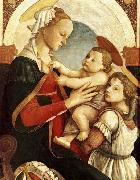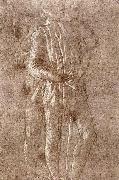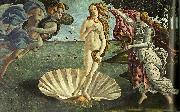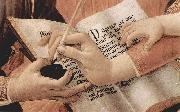All Sandro Botticelli Oil PaintingsItalian Early Renaissance Painter, 1445-1510 |
|||
 |
|||
|
|
|
||||||||||
|
|
||||||||||
|
Madonna and Child with an Angel Gemälde IDENTIFIZIERUNG:: 62396 |
Madonna and Child with an Angel 1465-67 Tempera on panel, 87 x 60 cm Spedale degli Innocenti, Florence It is possible that this somewhat awkward painting of the Madonna was produced while Botticelli was still working in the workshop of his teacher, Filippo Lippi. The initial inspiration for the painting came from the latter's famous Madonna in the Uffizi. Botticelli replaced the landscape with an arched architecture which frames the heads of the mother and child and emphasizes the two main figures as the centre of the devotional scene 1465-67 Tempera on panel, 87 x 60 cm Spedale degli Innocenti, Florence It is possible that this somewhat awkward painting of the Madonna was produced while Botticelli was still working in the workshop of his teacher, Filippo Lippi. The initial inspiration for the painting came from the latter's famous Madonna in the Uffizi. Botticelli replaced the landscape with an arched architecture which frames the heads of the mother and child and emphasizes the two main figures as the centre of the devotional scene |
|||||||||
|
|
||||||||||
|
|
Study of two standing figures Gemälde IDENTIFIZIERUNG:: 62400 |
Study of two standing figures 1475 Metal point on primed paper, white highlights, 165 x 100 mm Mus?e des Beaux-Arts, Lille This study is one of the few remaining drawings directly related to a painting by Botticelli. The artist, who to judge by the style may have been Botticelli's student Filippino Lippi, was testing the posture and stance of the two young men who can be seen at the front left in the Adoration of the Magi. There are differences in the head and hand positions of the figure at the rear, so that it is likely that this work was produced as part of the preparations for that group of figures 1475 Metal point on primed paper, white highlights, 165 x 100 mm Mus?e des Beaux-Arts, Lille This study is one of the few remaining drawings directly related to a painting by Botticelli. The artist, who to judge by the style may have been Botticelli's student Filippino Lippi, was testing the posture and stance of the two young men who can be seen at the front left in the Adoration of the Magi. There are differences in the head and hand positions of the figure at the rear, so that it is likely that this work was produced as part of the preparations for that group of figures |
||||||||
|
|
||||||||||
|
|
venus fodelse Gemälde IDENTIFIZIERUNG:: 64751 |
venus fodelse ca, 1485. galleria degli uffizi, florens se ca, 1485. galleria degli uffizi, florens se |
||||||||
|
|
||||||||||
|
|
Madonna del Magnificat Gemälde IDENTIFIZIERUNG:: 74131 |
Madonna del Magnificat Date Deutsch: um 1483-1485 English: c. 1483-1485 cyf Date Deutsch: um 1483-1485 English: c. 1483-1485 cyf |
||||||||
|
|
||||||||||
| VORHERIGER KÜNSTLER NÄCHSTER KÜNSTLER | ||||||||||
|
|
||||||||||
| Sandro Botticelli | ||||||||||
| Italian Early Renaissance Painter, 1445-1510 | ||||||||||
|
|
||||||||||
|
KONTAKTIEREN Sie UNS |









